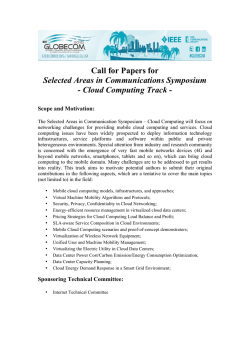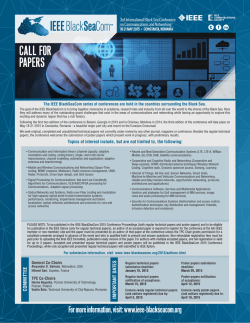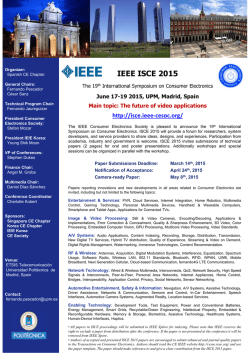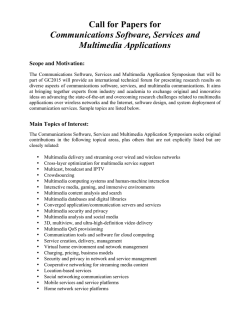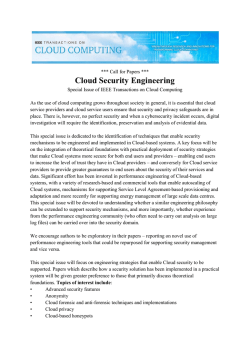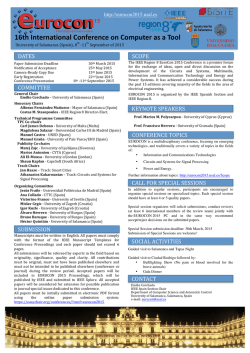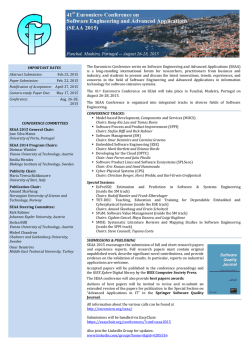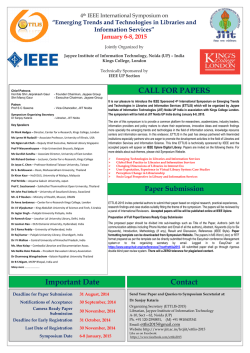
Quality of Experience-based Management for Future - QoE-FI
IEEE Workshop on Quality of Experience-based Management for Future Internet Applications and Services Sponsored by the Technical Committee on Multimedia Communications of the IEEE Communications Society http://qoe-fi.diee.unica.it Organized in conjunction with IEEE International Conference on Communications (IEEE ICC 2015) 8-12 June 2015, London, UK Recent technological advances have enabled a constant proliferation of novel immersive and interactive services that pose ever-increasing demands to our communication networks and add to their load. Examples are: social TV, immersive environments, mobile gaming, HDTV over mobile, 3D virtual world, book/newspaper consumption, social networking, IPTV applications, just to cite a few. Some of these services have already reached a major market success especially because a user-centered approach has been followed to design the whole process of content production, service activation, content consumption, and service (and network) management. In addition, we witness the trend of migrating end-to-end multimedia communication systems/platforms to the cloud. Media processing and consumption in the cloud requires attention from two main perspectives: maintenance of processing-related cloud operations over the execution time considering the end-user and application-related QoS/QoE requirements via dynamic resource provisioning; and the parallelization and abstraction of media processing tasks for the optimization of limited and shared cloud resources. Furthermore, the domain of Smart Cities offers new opportunities and use cases, but at the same time poses new challenges for keeping users engaged and interested in those services. This also includes other aspects such as quality of life as well as critical considerations such as user safety, particularly when it comes to urban transport and emergency scenarios. In this dynamically evolving context, network operators and service providers are struggling to keep their increasingly sophisticated customers content while remaining profitable at the same time. Consequently, optimization and management of QoE has become crucial issue in the deployment of successful services and products. However, even if the concept itself may seem straightforward to understand, it requires rather complex implementation processes for efficient performances in real end-to-end systems/networks. The complexity of QoE is mainly due to the difficulties in its modelling, evaluation, and mapping to objective Quality of Service (QoS) parameters, which, for more than a decade, has been used as a partial substitution to QoE, and due to its multidimensional end-to-end nature covering a wide range of networks, applications, systems, devices, contexts and expertise. On this background, the workshop is aimed at bringing together researchers from academia and industry to identify and discuss technical challenges, exchange novel ideas, explore enabling technologies, and report latest research efforts that cover a variety of topics including, but not limited to: QoE evaluation methodologies and metrics QoE control, monitoring and management strategies Frameworks and testbeds for QoE evaluation (crowd-sourcing, field testing, etc.) QoE in community-focused interactive systems QoE studies & trials in the context of Smart Cities QoE models, their applications and use cases QoE for immersive audio-video and interactive multimedia communication environments QoE-aware cross-layer design QoE-driven media processing and transmission over the cloud and over the top (OTT) KPI and KQI definition for QoE optimization in different environments Integration of QoE in infrastructure and service quality monitoring solutions Media analytics from QoE Big Data Standards for media coding (HEVC, HEVC for 3D, etc.) and transport (DASH, MMT, XMPP, etc.) Future Media Internet architectures Submission Procedure Submitted papers must represent original material which is not currently under review in any other conference or journal and has not been previously published. Paper length should not exceed t he six-page standard IEEE conference two-column format. Please see the author information page for submission guidelines on the ICC 2015 website http://icc2015.ieee-icc.org General Chairs: Ahmet Kondoz, Loughborough Univ. London, UK Luigi Atzori, University of Cagliari, Italy Raimund Schatz, FTW, Austria Technical Program Chairs: Markus Fiedler, BTH, Sweden Pedro Assuncao, Institute of Telecommunications/IPL, Portugal Tasos Dagiuklas, Hellenic Open University, Greece Panel Chairs: Weisi Lin, Nanyang Technological University, Singapore Periklis Chatzimisios, Alexander TEI of Thessaloniki, Greece Publicity Chairs: Adlen Ksentini, University of Rennes, France Nabil J. Sarhan, Wayne State University, USA Evangelos Pallis, TEI of Crete, Greece Important Dates Paper submission deadline: January 31, 2015 Author notification: March 1, 2015 Camera ready due: March 15, 2015
© Copyright 2026
